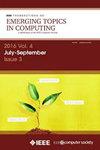Privacy-Preserving Publicly Verifiable Outsourced Distributed Computation Scheme for Matrix Multiplication
IF 5.4
2区 计算机科学
Q1 COMPUTER SCIENCE, INFORMATION SYSTEMS
IEEE Transactions on Emerging Topics in Computing
Pub Date : 2025-07-10
DOI:10.1109/TETC.2025.3584354
引用次数: 0
Abstract
Publicly verifiable outsourced computation (PVC) facilitates the data owner to outsource some computation-intensive tasks to the powerful but untrusted cloud server, while enabling any client to check the integrity of results with little cost. Matrix multiplication is a fundamental operation in mathematics, which is widely used in many real-world applications. In this paper, we focus on PVC for matrix multiplication (PVC2M) and propose a new primitive called privacy-preserving publicly verifiable outsourced distributed computation scheme (PPVDC) for matrix multiplication. Different from the existing PVC2M solutions, our proposed scheme offers higher efficiency and reliability, where the computation is jointly calculated by multiple workers. In such a distributed setting, the computation result can be recovered if the number of workers who perform the computation honestly is no less than threshold. Besides, another technical highlight is to enhance privacy. Even though all workers are corrupted and may collude, they are unable to obtain any knowledge about the matrix矩阵乘法的保密可验证外包分布式计算方案
可公开验证的外包计算(PVC)有助于数据所有者将一些计算密集型任务外包给功能强大但不受信任的云服务器,同时使任何客户端都能够以很少的成本检查结果的完整性。矩阵乘法是数学中的一种基本运算,在许多实际应用中得到了广泛的应用。本文重点研究了矩阵乘法的PVC (PVC2M)算法,提出了一种新的矩阵乘法原文——保持隐私的公开可验证外包分布式计算方案(PPVDC)。与现有的PVC2M方案不同,我们提出的方案具有更高的效率和可靠性,由多个工人共同计算。在这种分布式设置中,如果诚实执行计算的工人数量不少于阈值,则可以恢复计算结果。此外,另一个技术亮点是增强隐私。即使所有的工人都被破坏并可能串通,他们也无法获得关于数据所有者外包的矩阵$M$和协议结束时客户端发布的向量$x$的任何知识。安全性分析表明,在计算性的Diffie-Hellman假设下,我们提出的PPVDC方案能够满足预期的安全性要求。详细的性能分析和实验评估进一步验证了该方案的有效性。
本文章由计算机程序翻译,如有差异,请以英文原文为准。
求助全文
约1分钟内获得全文
求助全文
来源期刊

IEEE Transactions on Emerging Topics in Computing
Computer Science-Computer Science (miscellaneous)
CiteScore
12.10
自引率
5.10%
发文量
113
期刊介绍:
IEEE Transactions on Emerging Topics in Computing publishes papers on emerging aspects of computer science, computing technology, and computing applications not currently covered by other IEEE Computer Society Transactions. Some examples of emerging topics in computing include: IT for Green, Synthetic and organic computing structures and systems, Advanced analytics, Social/occupational computing, Location-based/client computer systems, Morphic computer design, Electronic game systems, & Health-care IT.
 求助内容:
求助内容: 应助结果提醒方式:
应助结果提醒方式:


